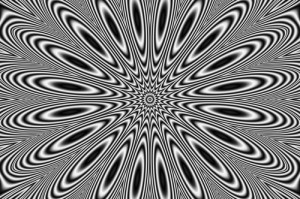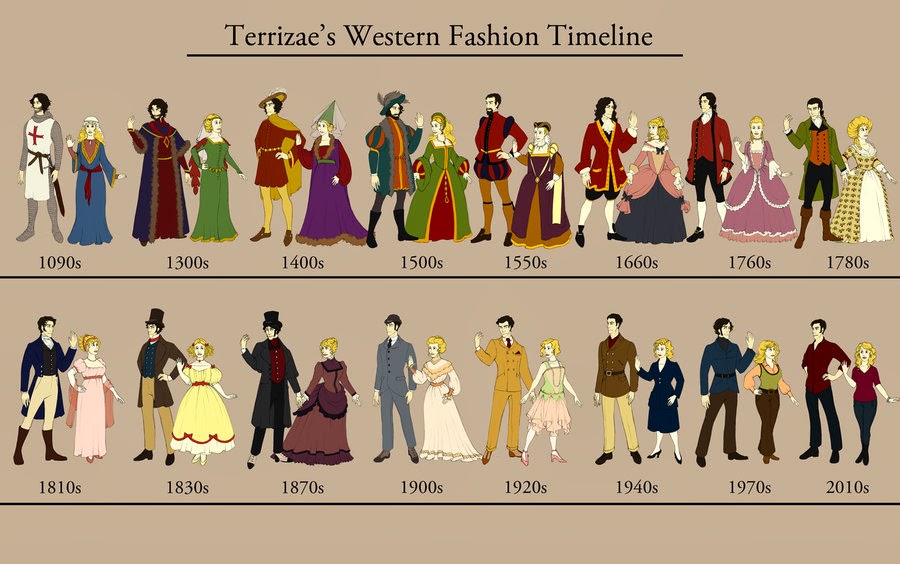|
Craig White's Literature Courses
Periods related terms: movement, style |
Periods mark stages of history in all arts, but most noticeably in fashion? (As usual, period styles appear restricted to European or Western history) |
Studying literature, art, history, etc. by periods sometimes annoys students (unless they like a period and its authors—and even then they may resist analyzing by period instead of why the authors and texts matter now).
Reasons students may resist study of periods:
-
Putting a name on a segment of past time threatens to put past lives or works in a box or coffin, limiting meanings to prescribed readings.
-
Time doesn't really operate by periods: periods overlap, blur, or run together—time is more like an arrow, river, network, or spectrum?
But period study serves multiple purposes:
-
building blocks of historical consciousness—knowledge of periods & their sequence can create historical depth instead of usual primitive distinction between everyone now alive and everyone now dead. (cf. historical fantasy like Xena, Warrior Princess, where Julius Caesar, Hercules, and Joan of Arc might meet in a single episode.)
-
periods = shorthand for standard "cultural literacy": quick references to Renaissance or Romantic era or style save explanations or "reinventing the wheel" if speaker and audience share reference.
With practice, periods become less constricting and even liberating.
A liberating defense of periodization: Learning a period's standards, rules, or inclinations sensitizes you to when someone does something different, new, or reactionary. You can tell the difference!
A slightly less liberating defense of periodization: Learning the influence of historical contexts on behavior or art helps us see similar influences in the present. The present flatters itself that any living mind is freer than those now ended by death, but the future will explain our limits by referring to our influences and contexts.
![]()
Quick scan of periods and major literary, cultural, or art / music figures:
Warnings:
Periods like genres are not "boxes" but rather "yardsticks" for measuring history, change, and continuity. The boundaries and overlaps between periods and movements are always under discussion and revision.
This list is Eurocentric but can always be diversified. History acknowledges multiple parallel tracks or narratives to history, but people find it difficult to think in terms of more than one.
Prehistory
Modern human species of homo sapiens appears app. 150,000-100,000 years ago; most of human biological and mental evolution occurs in small hunter-gatherer societies, a background that still affects human values, symbols, decision-making.
Prehistory starts way back and continues to end of Pleistocene era & last great glacial ice-age, app. 12,000 years ago. Invention of agriculture creates more or less permanent human settlements.
![]()
Human history begins . . . first written records in Mesopotamia app. 3200 BCE
![]()
Biblical Era?
Biblical time mostly occurs in other dimensions than historical time, though biblical time provides models for historical narrative. (esp. ideas of beginnings and endings).
Biblical scholars or theologians often dated history Anno Mundi, or since the Creation of the world, in ranges mostly from 6000-10,000 years.
Coordinating biblical time with historical time is further complicated by the background of eternity, divine perceptions of time, days as years or thousands of years, etc.
Judaic scholarship traditionally locates the beginning of the Exodus from Egypt to Canaan at 2448 AM or 1313 BC.
The time of Christ and his Apostles occurs mostly in the first century AD or Common Era, corresponding to Roman history from the time of the Roman Emperor Augustus to the Emperor Nero.
![]()
Classical Era
8th century BCE - 4th century AD / CE
Classical Greece and Rome: beginnings of
modern science, philosophy, literature, architecture, politics
Homer, Aeschylus, Sophocles, Euripides, Socrates, Plato, Aristotle, Caesar
Epistemology or method of thinking: increasing use of reason, empiricism, skepticism.
![]()
Middle Ages (400-1400 AD / CE)
400-1400 AD / CE: fall of classical empires leads to Dark Ages
and rise of medieval church institutions and social organizations, which maintain
selected traditions of classical learning;
rise of Islam + additional maintenance of classical learning
Giotto, Joan of Arc, Charlemagne
Epistemology or method of thinking: revelation (mostly through scripture), tradition, authority
![]()
Renaissance (1400s-1600s)
1400-1600: "re-birth of classical humanism"
or rediscovery of neglected dimensions of classical
learning; printing press
+ “Age of Discovery”: Early Spanish, British, Portuguese
empires (+ Dutch!)
Columbus, Michelangelo, Da Vinci, Shakespeare, Gutenberg
Epistemology or method of thinking: revelation giving place to renewed emphasis on reason, empiricism
![]()
The Seventeenth Century (1600s)
Religious Reformation and Counter-Reformation:
height & depth of European religious expression
Height: Many great religious leaders and writings; early days
for many national Protestant faiths + defense of Catholic Church lead to
searching spiritual expressions and “reformation” of souls (Music: Monteverdi,
Bach; Painting: Valasquez, Rembrandt; Literature: John Donne, George Herbert,
William Law)
Depth: Religious warfare, witch-crazes and witch holocaust
The "Seventeenth Century" doesn't get a descriptive name because it's such a transitional time that it embodies the religious enthusiasm of earlier times (updated) but is also trending toward the Enlightenment in science, technology, and quality of life.
Effect on our
present: establishes religious institutions,
especially as national denominations; inaugurates
continuing
Protestant Reformation, in which new churches constantly branch off from
established ones
![]()
Enlightenment, Age of Reason, Neo-Classical Period (Late 1600s > 1700s)
Reaction against religious enthusiasm of previous period, development of empirical, rational, and humanistic social organizations.
The Enlightenment is "the great leap forward" in human history, both liberating and frightful. New empirical learning frees people from reverence for many false or supernatural traditions and re-orients human activity toward the world in which we actually live. Humans learn how to command or exploit the natural world for greater power. We also begin to learn "human nature" and how to control or balance its dangerous tendencies.
Epistemology or method of thinking: reason, logic, empiricism (what can be observed and measured by the senses; "the here and now")
Scientific Revolution: Isaac Newton; invention or development of calculus, telescope, microscope; improved public hygiene; significant advances in mathematics, physics, biology, electricity.
Politics: Constitutional Government (French & American Revolutions; British "Glorious Revolution")
Economics: Capitalism (Adam Smith, The Wealth of Nations [1776]), material progress (hygiene, nutrition, population growth, life extension)
Music: Haydn, Mozart, Boyce
Literature: Voltaire, Jonathan Swift, Dr. Johnson, Benjamin Franklin, Alexander Pope, Thomas Jefferson
Epistemology or method of thinking: reason + empiricism: empirical = observational; conclusions or judgments are based on real-world observations, concrete or perceptible evidence, subject to reason. Contrast revealed knowledge, tradition, or innate / a priori ideas.
Enlightenment thought disfavors the feelings and passions or spiritual revelation as dependable guides or frameworks for human society (e.g., the U.S. Constitution establishes no religion, but it also recognizes that human nature is religious, so it also allows freedom of religion).
But the Enlightenment never thinks that emotional or spiritual feelings or motivators just disappear. Instead, such elements of human behavior are factored, balanced, and controlled so that they do not disrupt the proper functioning of society.
Long-term cultural effects: Most institutions of Western culture were established during the Enlightenment:
-
Freemarket capitalism formalized (Adam Smith, The Wealth of Nations 1776)
-
Liberal constitutional governments with transparency, self-government, and human rights
-
Science and technology as progress. Period of fossil fuels begins (invention of steam engine powered by coal), increasing productivity but also degrading environment.
-
Enlightenment God or "Providence" over all but not intervening except privately
![]()
Romantic era (a.k.a. "Age of Revolution")
Late 1700s->1800s in Europe; 1820s-1860s in early USA.
Politics, Economics: rise of common-man democracy, Industrial Revolution, urbanization; nationalism or national identity becomes greater than regional or local identity.
Epistemology or method of thinking: Reason + imagination, feeling, intuition, passion, emotion; personalized spiritual yearnings, transcendence of here and now (beyond empiricism or the limits of the here-and-now)
Music: Wagner, Beethoven, Chopin, Brahms, Tchaikovsky
Literature: Goethe, Hugo, Wordsworth, Keats, Shelleys, Brontes, Walter Scott, Cooper, Emerson, Whitman, Poe
In American literature, the Romantic era may be identified as the American Renaissance or Transcendentalism.
The Romantics continue to value reason as a mental faculty but extend the
Enlightenment’s interest in the actual natural world to a spiritual
or imaginative dimension, which reflects, satisfies, or challenges human longing for
transcendental meaning and emotional attachment instead of objective detachment.
Effect on our
present: popular culture in late 20th-early 21st centuries constantly replays &
reinforces Romantic
attitudes and aesthetics
-
Love of children as innocent, holy creatures; nostalgia for earlier, simpler times
-
Nature as abode of spirit, path to God
-
Nuclear-family values of cooperative peace in competitive world
-
Gothic world of death, decay, depravity as dangerously attractive nightmare to Enlightenment life-world
Romanticism is normally associated with Revolution (e.g. the French Revolution and other European revolutions of the early-mid 1800s), but in many respects Romanticism is reactionary, reaching back before the Enlightenment for greater spiritual meaning or worth for the individual.
![]()
Victorian era (Great Britain) / Realistic period (USA) (both of these may only be extensions, variations, or reforms of Romanticism)
Later 1800s-early 1900s (Queen Victoria reigned 1837-1901; Realism in USA followed U.S. Civil War of 1861-65, persisted into early 20c + some continuities with Modernism)
Great Britain: Charles Dickens, Alfred Lord Tennyson, George Eliot, Brownings, Thomas Hardy
USA: Henry James, Edith Wharton, Mark Twain, Stephen Crane, Sarah Orne Jewett
![]()
Modernism / Modernist period
First half of 20th century (World War 1-World War 2?)
Picasso, Stravinsky, Yeats, Eliot, Woolf, Lawrence
![]()
Post-Modernist period
Since 1945? Since early 70s?
Recombination of styles from past periods. Genres mash together.
Capacity for true novelty or innovation questioned.
The End of History?
Technological and digital revolution increasingly moves human consciousness from physical to virtual reality.



